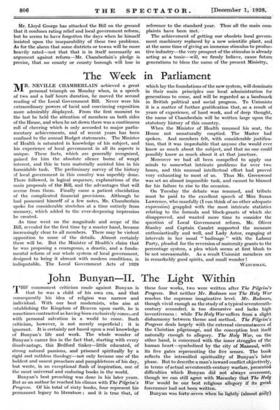The Week in Parliament
MR. NEVILLE CHAMBERLAIN achieved a great personal triumph on Monday when, in a speech of two and a half hours duration, he moved the second reading of the Local Government Bill. Never were his extraordinary powers of lucid and convincing exposition more admirably displayed. From the first moment to. the last he held the attention of, members on both sides of the House, and when he sat down there was a continuous roll of cheering which is only accorded to major parlia- mentary achievements, and of recent years has been confined to the 'annual Budget statements. The Minister of Health is saturated in knowledge of his subject, and his experience of local government in, all its aspects is unique. These facts, which are generally recognized, gained for him the absolute silence borne of wrap interest, and this in turn materially assisted him in his formidable task. The preliminary survey of the history of local government in this country was superbly done. There followed, in logical sequence, explanations of the main proposals of the Bill, and the advantages that will accrue from them. Finally came a patient elucidation of the complicated financial provisions. Although he had possessed himself of a few notes, Mr. Chamberlain, spoke for considerable stretches at a time entirely from memory, which added to the ever-deepening impression he created.
As time went on the magnitude and scope of the Bill, revealed for the first time by a master hand, became increasingly clear to all members. There may be violent opposition to some of the details. Almost certainly_ there will be. But the Minister of Health's claim that he was proposing a courageous, a drastic, and a funda- mental reform of our whole system of local government, designed to bring it abreast with modern conditions, is indisputable. The Local Government Acts of 1929 which lay the foundations of the new system, will dominate in their main principles our local administration for generations to come, and will be regarded as a landmark in British political and social progress. To Unionists it is a matter of further gratification that, as a result of years of experience, of hard work, and of deep thought, the name of Chamberlain will be written large upon the statutory history of this country.
When the Minister of Health resumed his seat, the House not unnaturally emptied. The Master had spoken. And members felt, with considerable justifica- tion, that it was improbable that anyone else would ever know as much about the subject, and that no. one could possibly know as much about it at that juncture.
Moreover we had all been compelled to , apply our minds to somewhat intricate problems for over two hours, and this unusual intellectual effort had proved very exhausting to most of us. Thus Mr. Greenwood was set an almost impossible task, and cannot be blamed for his failure to rise to the occasion.
On Tuesday the debate was resumed, and_ tribute must be paid to the excellent speech of Miss Susan Lawrence, who manfully (I can think of no other adequate expression) grappled with the most intricate. statistics relating to the formula and block-grants of which she disapproved, and wanted more time to consider the question of Local Government reform. Mr. :Oliver Stanley and Captain Cazalet supported the measure enthusiastically and well, and Lady Astor, engaging at intervals in her usual " badinage " with the Labour Party, pleaded for the reversion of maternity grants to the percentage system, a plea which seems at first_ blush to be not unreasonable. As a result Unionist members are in remarkably good spirits, and small wonder !
VVATCHMA*,








































 Previous page
Previous page